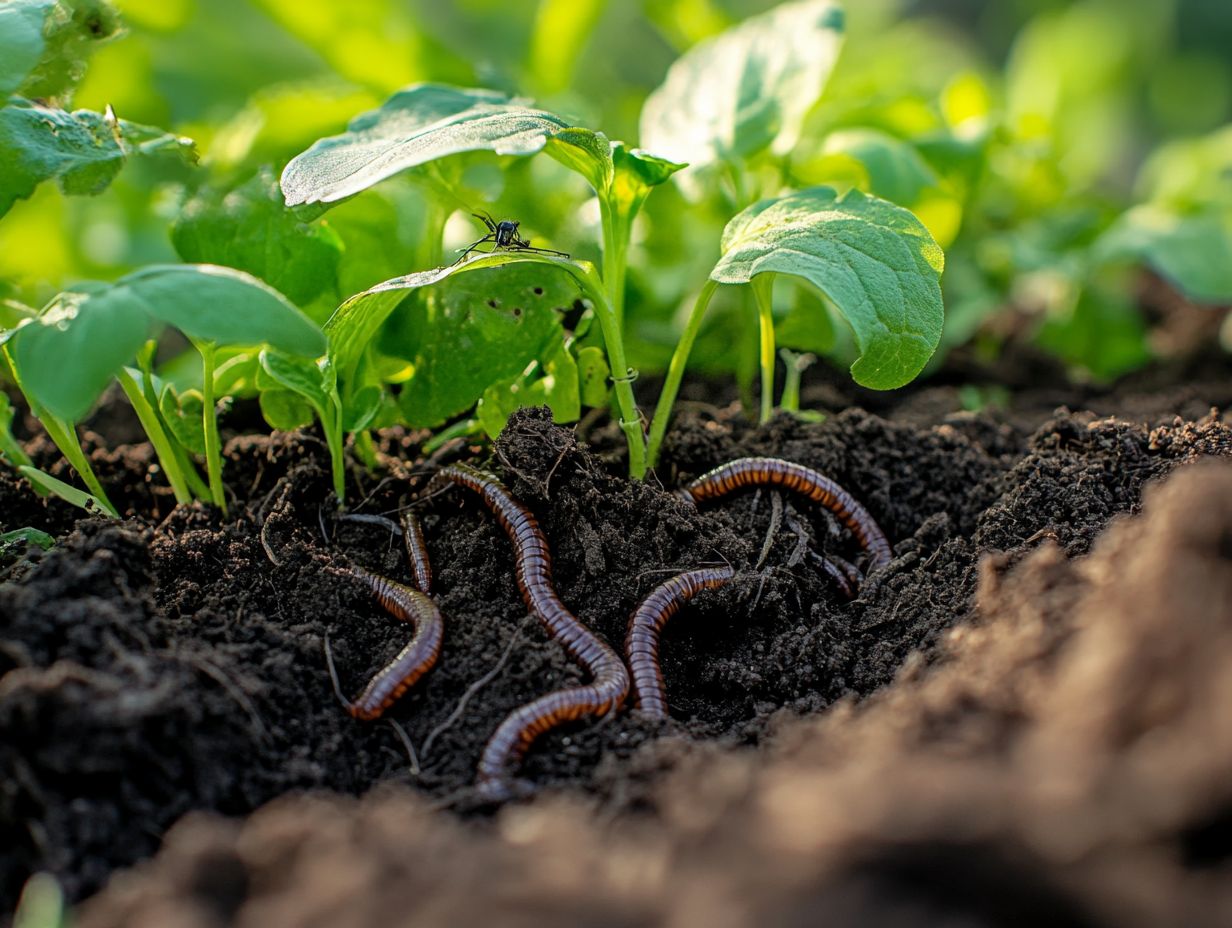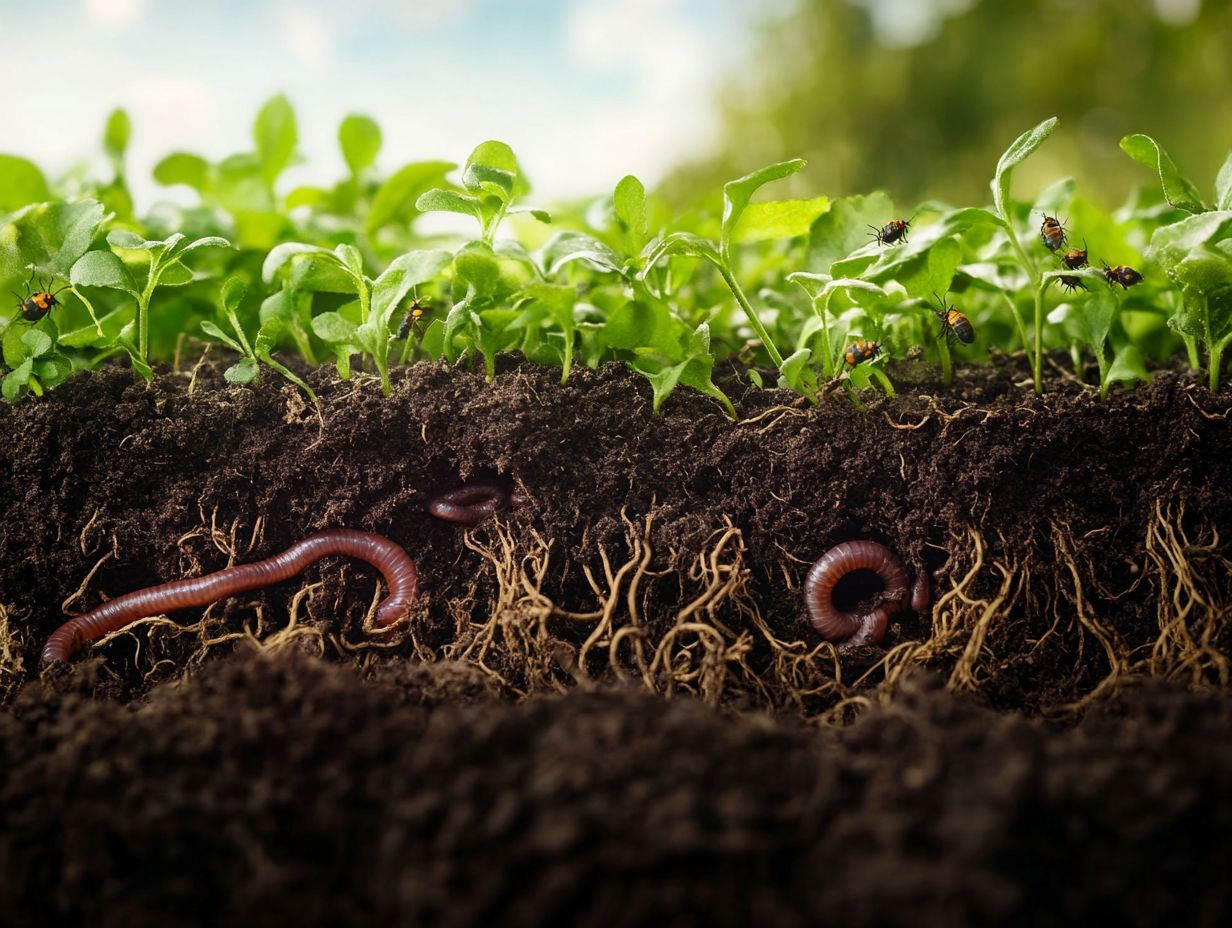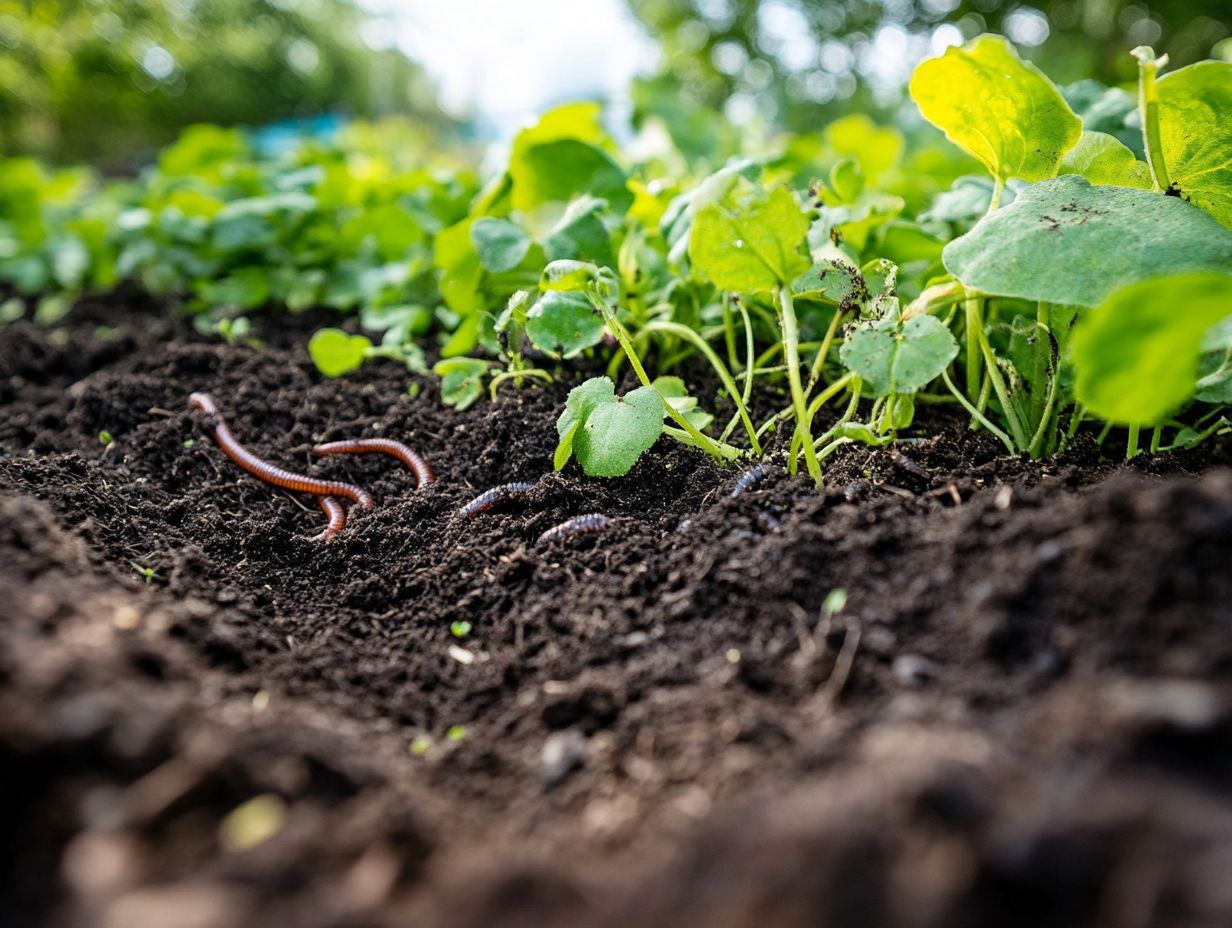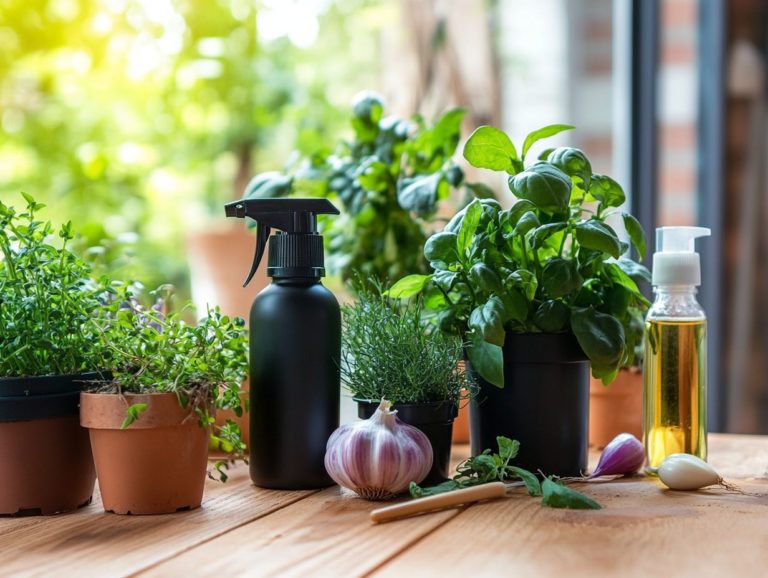The Benefits of Healthy Soil in Pest Management
Healthy soil serves as the cornerstone of flourishing ecosystems, significantly influencing pest management. Its connection with insect pests transcends mere biology; healthy soils act as a natural deterrent, fostering plant resilience and minimizing reliance on chemical solutions.
This article delves into how nurturing vibrant, nutrient-rich soil can revolutionize your pest control approaches, elevate crop yields, and provide substantial environmental benefits, aligning with ecological principles.
Explore the best practices for soil management and uncover the myriad advantages that healthy soils offer in both farming and gardening, including improved soil quality and a greater variety of living things.
Contents
- Key Takeaways:
- The Importance of Healthy Soil in Pest Management
- How Healthy Soil Can Help with Pest Control
- Methods for Maintaining Healthy Soil
- The Role of Soil Testing in Pest Management
- Additional Benefits of Healthy Soil
- Frequently Asked Questions
- What are the benefits of having healthy soil in pest management?
- How does healthy soil promote natural pest control?
- Can healthy soil reduce the need for pesticides?
- What are some other benefits of healthy soil?
- How can I maintain healthy soil in my garden?
- Can healthy soil also benefit larger agricultural operations?
Key Takeaways:

- Healthy soil is essential for effective pest management, as it promotes a natural balance between insect pests and their natural enemies.
- Act now! Nurturing healthy soil with sustainable practices can drastically improve your pest control!
- Soil testing is a valuable tool in identifying nutrient imbalances that can attract pests. Maintaining healthy soil leads to environmental benefits and increased crop yields.
The Importance of Healthy Soil in Pest Management
Healthy soil is the cornerstone of effective integrated pest management (IPM) practices, offering the essential nutrients and ecological balance that sustainable agriculture demands. By prioritizing soil health, you enhance a greater variety of living things, which plays a pivotal role in controlling insect pests while reducing your dependence on chemical pest control methods.
The USDA Natural Resource Conservation Service underscores the importance of healthy soils for nurturing beneficial organisms, thereby establishing a robust soil food web.
This natural web regulates pest populations and supports agricultural systems, such as those promoted by Penn State and Cornell University. This holistic approach harmonizes with ecological principles, advocating for sustainable farming practices and providing long-term solutions to pest challenges.
Understanding the Relationship Between Soil and Pests
The intricate relationship between soil health and insect pests is crucial for understanding pest dynamics within agricultural ecosystems.
When your soils are healthy, brimming with a diverse array of microorganisms and beneficial arthropods, they create a thriving environment that naturally keeps pest populations in check. Beneficial insects, like predatory beetles and parasitic wasps, thrive in these rich soil ecosystems, establishing a natural balance that curbs the spread of harmful pests.
Microbial decomposition is vital for breaking down organic matter, releasing nutrients that support plant health and, in turn, attract beneficial species, including beneficial fungi. By nurturing biological diversity in your soils, you can implement effective pest management strategies that lessen the need for chemical interventions, promoting long-term sustainability in your agricultural practices.
How Healthy Soil Can Help with Pest Control
Healthy soil is essential for effective pest control, creating an environment that nurtures beneficial fungi and bolsters crop resilience. By incorporating practices like crop rotation and cover crops, you can significantly enhance the vitality of your soil, leading to more robust and thriving plants.
Natural Pest Deterrents Found in Healthy Soil
Healthy soil serves as a thriving ecosystem for natural pest deterrents, such as beneficial arthropods and microbial communities that play a pivotal role in pest regulation.
These organisms are essential in maintaining ecological balance, as they naturally suppress pest populations, including insect pests, while promoting the health of your plants. For example, predatory insects like ladybugs and lacewings feast on aphids and other harmful pests, effectively lowering their numbers without resorting to chemical solutions.
Some fungi and beneficial microorganisms in the soil boost plant resilience by outcompeting pathogens, creating a protective barrier around your crops. This harmonious relationship between plants, beneficial arthropods, and microorganisms cultivates a sustainable agricultural environment, ensuring higher yields and less reliance on synthetic pesticides.
Ready to transform your pest control methods? Start improving your soil today and watch your plants thrive!
Improving Plant Health and Resilience

Improving your plant health and resilience is crucial for effective pest management. Healthy soils play a pivotal role, significantly enhancing nutrient uptake and supporting beneficial fungi.
The connection between soil vitality and plant strength is unmistakable. When you cultivate rich, well-aerated soils, your roots can access essential minerals and water more efficiently. This nutrient-rich environment fosters robust plant growth and bolsters their natural defenses against pests.
For example, practicing crop rotation, particularly corn-soybean rotation with cover crops, enhances soil structure and health. This creates an inviting habitat for earthworms and other beneficial organisms that aerate the soil. Embracing organic farming techniques minimizes chemical inputs and nurtures a diverse microbial community.
This synergy results in healthier plants that are considerably more resilient to insect infestations and diseases.
Methods for Maintaining Healthy Soil
Healthy soil is the backbone of thriving plants and successful pest control! Maintaining healthy soil is essential for sustainable agriculture and the importance of soil health in pest control.
You can explore various methods, such as no-till farming and organic practices, which are highly endorsed by the USDA Natural Resource Conservation Service.
Prioritizing soil health enhances productivity and promotes a balanced ecosystem, ensuring long-term success in your agricultural endeavors.
Best Practices for Soil Management
Implementing best practices for soil management is crucial for optimizing soil health and achieving sustainable agriculture.
These practices encompass essential techniques such as crop rotation, cover crops, and organic amendments. By rotating crops, you effectively disrupt pest and disease cycles, minimizing the need for chemical interventions.
Cover crops enhance soil structure, increase organic matter, and promote nutrient cycling, all advantageous for soil ecosystems.
Incorporating organic amendments like compost not only enriches the soil but also nurtures beneficial microbial communities. Together, these strategies create a more balanced ecosystem, leading to robust pest management, healthier crops, and improved long-term productivity.
Using Organic and Sustainable Techniques
Don’t miss out on the powerful benefits of using organic and sustainable techniques! Utilizing organic and sustainable techniques enhances soil health and cultivates an effective integrated pest management system that uses natural methods to control pests.
By reducing your reliance on synthetic chemicals, you can naturally restore the nutrient balance in the soil, allowing microbial communities to flourish. Embracing practices like crop rotation, cover cropping, and the introduction of compost enriches the soil and fosters greater biodiversity.
These methods support healthier plants and resonate with ecological principles prioritizing long-term sustainability.
Adopting various organic farming methods, such as agroforestry and permaculture, helps create a harmonious balance between your crops and the surrounding ecosystem, ultimately boosting resilience against pests and diseases.
The Role of Soil Testing in Pest Management
Soil testing is essential for effective pest management. It allows you to pinpoint nutrient deficiencies, including nitrogen levels, and imbalances that can significantly affect both the quality of your soil and the resilience of your crops.
This proactive approach gives you the power to make informed decisions, ultimately fostering healthier plants and a more robust agricultural ecosystem.
Explore these techniques today to transform your gardening experience!
Identifying Nutrient Deficiencies and Imbalances

Identifying nutrient deficiencies and imbalances through soil testing is crucial for effective integrated pest management and maintaining overall soil health to support agricultural systems.
When you understand the specific nutrients your soil is lacking, you can take targeted actions to replenish these essential elements. This ultimately supports robust plant growth. Nutrient deficiencies be it nitrogen, potassium, or magnesium not only hinder plant development but also leave crops vulnerable to diseases and pests. Weak plants simply can t defend themselves as effectively.
Utilizing various soil testing methods, such as sampling for pH, organic matter, and micronutrient levels, gives you the power to interpret the results accurately. With clear insights from these analyses, you can fine-tune your fertilization strategies, enhancing plant vigor and resilience against pest pressures while fostering a healthier soil environment.
Additional Benefits of Healthy Soil
Healthy soil also provides a wealth of additional benefits. It boosts environmental sustainability and translates into cost savings for farmers, all while enhancing crop yields.
Environmental Benefits
The environmental benefits of healthy soil are numerous. They play a crucial role in sustainable agriculture by enhancing water retention, boosting biodiversity, and supporting healthy soil initiatives.
Maintaining healthy soils also supports vital ecosystem services such as carbon sequestration and nutrient cycling. Both are essential in the face of climate change. Soils serve as natural buffers against extreme weather events, contributing to resilience in agricultural systems. This connection between soil health and climate resilience emphasizes the necessity of integrated pest management strategies. Healthier soils can diminish pest populations while promoting beneficial organisms.
By adopting practices that prioritize soil vitality, you strengthen your crops and enhance the broader ecosystem. This fosters a harmonious balance that benefits both agriculture and the environment.
Cost Savings and Increased Crop Yields
Investing in healthy soil not only saves you money but skyrockets your crop yields, positioning it as a vital element of sustainable agriculture and effective pest management.
By enhancing soil structure and the health of the microbiome, you can reduce your dependence on chemical fertilizers and pesticides, ultimately lowering your production costs. A case study from Iowa revealed that farmers who adopted cover cropping and reduced tillage practices experienced a remarkable 15% increase in corn yields, equating to an extra $100 per acre.
Research highlights that healthy soils promote improved water retention and nutrient cycling, which enhances overall crop resilience. This gradual transition toward overall soil care benefits the environment and plays a crucial role in securing your financial future as a farmer.
Frequently Asked Questions
What are the benefits of having healthy soil in pest management?

Healthy soil can help control pest populations by promoting natural pest control mechanisms, such as beneficial insects and microorganisms that prey on pests. It also helps promote plant health, making them more resilient to pest attacks.
How does healthy soil promote natural pest control?
Healthy soil contains a diverse range of beneficial organisms, such as predatory insects and microorganisms, that naturally control pest populations. These organisms help keep pest numbers in check without the use of harmful chemicals.
Can healthy soil reduce the need for pesticides?
Yes, healthy soil can reduce the need for pesticides by promoting natural pest control and improving plant health. This helps protect the environment and reduces the risk of harmful chemicals entering our food supply.
Take action today! Invest in your soil health to reap the benefits of better crops and a healthier environment.
What are some other benefits of healthy soil?
Healthy soil offers many benefits beyond pest control. It improves soil structure, retains water better, and increases nutrient availability.
It also supports a variety of plants. This diversity helps prevent pest outbreaks.
How can I maintain healthy soil in my garden?
To keep your soil healthy, avoid over-tilling and using chemical fertilizers. Instead, opt for organic fertilizers and practice crop rotation.
Encourage a mix of plants in your garden. This variety boosts biodiversity and supports soil health.
Can healthy soil also benefit larger agricultural operations?
Absolutely! Healthy soil can transform larger farms. It promotes natural pest control, reducing the need for pesticides.
This not only lowers production costs but also improves crop health and productivity.






